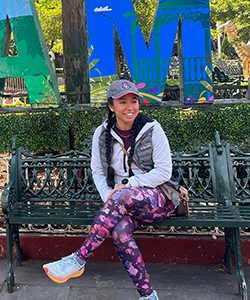Meet Our Researchers: Lorena Aceves
Author
 Lorena Aceves is a research scientist in Child Trends’ education research area.
Lorena Aceves is a research scientist in Child Trends’ education research area.
Lorena, can you kick us off by briefly describing your research activities and responsibilities?
I wear many hats in my day-to-day research: I serve as co-PI and project director on a few projects and as task lead on some others. My main responsibilities include anything from crunching code in Stata, to running descriptive data analyses, to writing evaluation reports for technical assistance provided by Child Trends, to developing new research ideas focused on Latinx children and youth. The common thread in my work is that it is all education-based and serves students of color in some way.
Can you tell us about your primary research interest(s)?
My research focuses on understanding the cultural, familial, and individual-level factors that contribute to Latinx children and youth’s educational experiences. Examining this combination of factors is important, especially among students of color whose culture and communities play a great role in their academic success. This approach also highlights Latinx children and youth’s existing strengths that help them succeed in school.
What sparked your interest in Latinx children and youth’s educational experiences?
My interest in this topic was sparked by my own experiences as a first-generation Latina. I witnessed differences among the educational trajectories of the Latinx kids in my neighborhood and among my extended family. As the oldest of 30 grandchildren on my mom’s side of the family, I was the first to graduate high school and attend college. I saw my cousins pursuing post-high school routes that differed from my educational journey. In college, I learned I could pursue a PhD and spend my career conducting research of my own design. I became invested in understanding the combination of factors that lead to these diverse educational journeys among Latinx children and youth. My curiosity led me to build a research portfolio exploring the diverse combinations of cultural experiences and values, the academic socialization that happens within nuclear families, and students’ individual dispositions and identities that shape their educational experiences.
What books or journal articles have most influenced you?
The paper that most influenced my research career is “An integrative model for the study of developmental competencies in minority children.” The model shared in this paper has been the foundation for how I approach a lot of my research. Given that my work focuses on Latinx children, youth, and their families, the paper provides a good approach for understanding the developmental experiences of children and youth of color from a strengths-based approach. Just because one group does something different does not make their behavior or process “deficient”—it is simply unique to that group or community.
What are your hobbies or interests outside of research?
When I am not working as a research scientist, I enjoy running and hiking. I currently live in the Southwest and enjoy runs and hikes at sunrise. I am a morning person, so this is a real treat for me. And better yet that I can run and hike year-round!
To wrap up, can you tell us a fun or interesting fact about yourself or your family?
I host my own podcast! I love highlighting my fellow Latinx scholars’ and colleagues’ journeys in pursuing their PhDs and/or careers. I feel the best way to learn is from hearing people’s stories, which contain so much power and knowledge. In some episodes, I share my own wisdom based on my own professional and personal experiences. My podcast is titled Vida de PhD (“Life of a PhD”) and you can find it here.
Learn More
© Copyright 2024 ChildTrendsPrivacy Statement
Newsletter SignupLinkedInThreadsYouTube